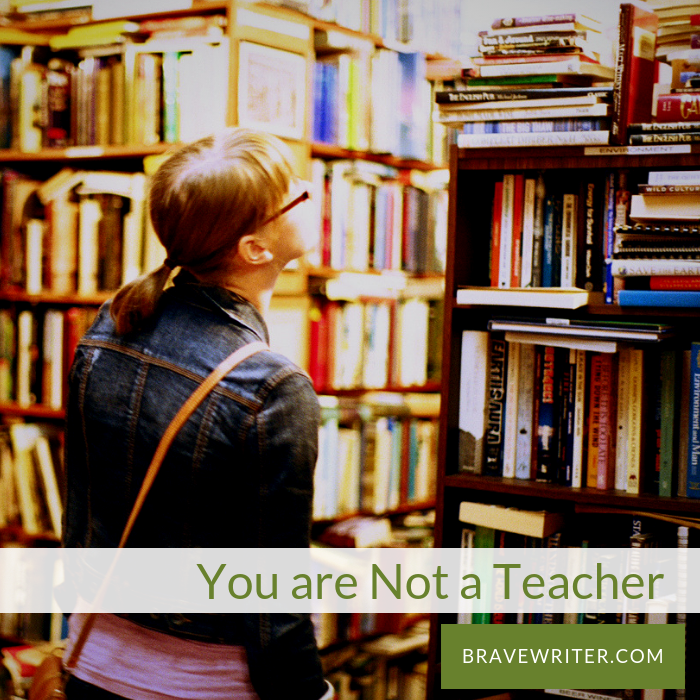You are Not a Teacher

As a career goal, wanting to be a “teacher” is not one I would choose. I might choose to teach (for instance, I love teaching theology at Xavier University, I love teaching writing to my students at Brave Writer, and I loved teaching acting to the homeschool co-op students). But without a specific subject area, teaching in and of itself doesn’t interest me. Being a “teacher” is less interesting to me than participating in the learning process in subjects I care about.
We grew up in schools, most of us. We are aware of adults who choose teaching as careers. Some choose to teach because they love children. Some choose to teach because they love lesson-planning and creating a classroom environment. Many choose to teach because once proficient in their favorite subject, they enjoy passing that information on to the next generation. Of course there are those who choose to teach because they’ve seen teaching modeled as an adult career for 12+ years of their lives, and they can envision themselves in that role in a way they can’t imagine themselves into any other adult field.
In homeschool, we are in an entirely different environment from school. “Teaching” in its school sense is counterproductive to your goals.
You won’t likely stand in front of a dry erase board, poised to lecture your four kids. You don’t consult a set of criteria delivered to you by the board of education and figure out how to squeeze that into your year.
What you can do and do almost effortlessly, though, is model learning. Your enjoyment of the books you read aloud, your passion to track down information about a historical fact, your curiosity about nature and art create an appetite for learning in your home. This lifestyle of learning starts with you, a learner—not you, the teacher. You don’t teach kids to value learning. You learn. You value it. You live it.
I like to say that we should live our passionate curiosities in front of our kids. If reading about Charlotte Mason’s advocacy for art appreciation has piqued your interest in art, dive in. No lesson plan. No script for exciting children about art. Simply get interested in art:
- Buy the books with large photos of paintings and pore over them while you sip your morning coffee.
- Leave them on the coffee table and page through them while you nurse the baby.
- Load the DVD player with Sister Wendy’s Story of Painting and watch—right in the middle of the morning, when “school” should be happening.
- Get out the charcoal pencils and try your hand at drawing your hand. You can do this while a child is working on math. At the same table.
Likewise, if reading a book about the Sioux tribe to your children makes you want to know more information about what happened to Native Americans in South Dakota, Google it. Read the information to yourself, for yourself. You can share it, if a child is interested. But you be interested. Learn it for yourself.
Sometimes what matters to your child will overlap with what matters to you. Reveal how connections (the science of relations) creates a tapestry of education. Perhaps the artwork you are looking at depicts an era in history that is a current fascination of your son’s. Show the paintings as snapshots in time of the very era being studied in text. Discuss. Perhaps several different painters (in different eras) depict the Greek myths according to the tastes of their time. If you and your children are enjoying reading the myths, these paintings could be a wonderful companion to that study. Compare. Consider.
You might be passionate about much more mundane subjects, too. I spent about a decade obsessed with the rock band, U2. I read daily articles, books, watched films, went to concerts, listened to their albums. My kids watched me develop a passion that led to so much in my life (from music to politics to theology to geography to published writing—mine about the band!).
What sets homeschooling apart is the ability to lead a life of learning with your children (not in addition to, not instead of, not on purpose to “teach” something). You get to pursue what interests you, and in the process your children will see a real living model of learning. THAT education is worth dozens of textbooks. You are giving your children a template for how to be self-teaching, how to cultivate a curiosity, how to pursue a passion.
That’s the real education. That’s the best kind of teaching.
Image by Laura D’Alessandro (cropped, tinted, text added)


















